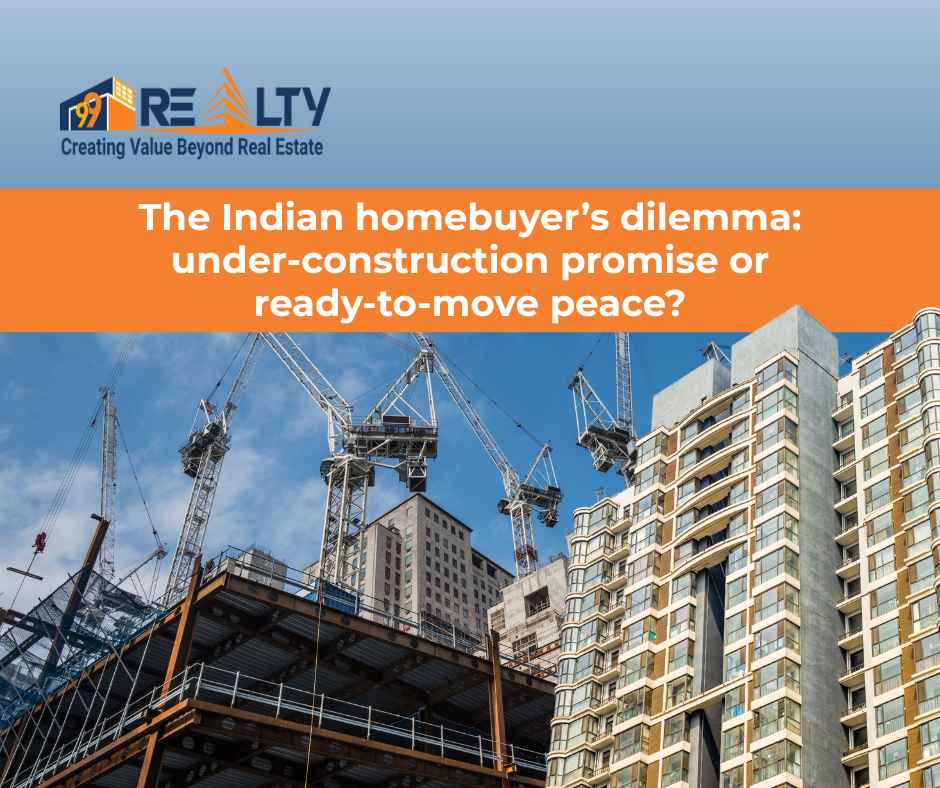In India, buying a home is still seen as a milestone of stability and prestige. But every Indian homebuyer faces a big question: should you book an apartment at the time of launch when construction has just started, or wait until the project is complete and ready for immediate occupation? The choice is a lot like booking a train ticket on IRCTC months in advance versus walking into the station and paying a premium for a last-minute seat — you could save by being early, but you’re also taking on uncertainty. Understanding how this plays out in the Indian market is key to making a confident, financially smart choice.
Understanding the Two Stages of Property Buying in India
Before weighing pros and cons, let’s clarify what each stage means in the Indian real-estate ecosystem, which is regulated by the Real Estate (Regulation and Development) Act, 2016 (RERA).
Benefits of the RERA Act for Homebuyers
What is a Project-Launch or Under-Construction Property?
In Indian cities like Bengaluru, Pune, or Noida, developers frequently start marketing units while work is still on the drawing board. You book your unit when construction is underway, paying in instalments linked to milestones like plinth, slab, or finishing. Developers do this to raise funds early, which means they’re willing to offer attractive launch prices or schemes like “no EMI till possession.” For you, it’s like investing in a sapling that could grow big if nurtured well.
What is a Completed or Ready-to-Move Property?
A ready-to-move property in India is tangible. The builder has received the occupancy certificate from the local municipal authority, and you can walk through the actual flat, check the vastu compliance, sunlight, and ventilation, and shift in as soon as paperwork is complete. Banks like SBI or HDFC usually disburse loans faster for such homes because risk is low.
Pros of Buying at Project Launch (Under Construction) in India
Lower Entry Price and Attractive Discounts
Indian developers woo early birds with prices 10–30% lower than post-completion rates. For example, in areas like Hinjawadi in Pune or Whitefield in Bengaluru, the difference can be several lakhs. This can translate into big savings or higher resale gains.
Flexible Payment Plans and Early-Bird Schemes
Under-construction projects in India often allow staggered payments over two to five years. Some even offer “no EMI till possession” or “subvention” schemes. This staged payment structure is especially useful for salaried buyers still building up savings.
Higher Appreciation Potential
If you buy early in an area slated for a new metro line (Delhi, Nagpur, Pune) or a Smart City upgrade, your property’s value can leap by the time you get possession. This is why many Indian investors love pre-launch deals.
More Choices in Units and Customisation Options
At launch, you’re first in line for the best-facing apartments, prime floors, or even minor layout tweaks. By the time a project is complete, these choices shrink drastically.
Benefits of Living in a Gated Society vs Standalone Apartment Building
Cons of Buying at Project Launch in India
Construction Delays and Uncertainty
Even reputed builders in India can face delays due to regulatory approvals, funding issues, or environmental clearances. A promised 3-year delivery can stretch upto 5 or 6 years.
Risk of Developer Default or Quality Compromise
Although RERA has reduced fraud, some developers still cut corners or abandon projects. Unless you research thoroughly, you may end up with a product very different from what was promised on papers.
Additional Rent or EMI Burden While Waiting
If you’re renting elsewhere while paying pre-EMIs on your loan for the under-construction property, the combined outgo can be heavy — a common pain point for Indian middle-class buyers.
Pros of Buying a Ready-to-Move Property in India
Immediate Possession and Zero Waiting Time
Once the paperwork and payment are done, you can move in immediately. This certainty is especially valuable in cities with high rents like Mumbai, Bengaluru, or Gurugram.
What-You-See-Is-What-You-Get (No Surprises)
You can physically inspect the apartment, check the sunlight, test the water pressure, inspect the finishing, and even talk to existing residents about maintenance quality. This transparency dramatically reduces the risk of disappointment.
Real Estate Transparency: Building Trust for Better Deals
Established Neighbourhood and Amenities
By the time a project is complete, the surrounding infrastructure — roads, shops, schools — is usually operational. Think of areas like Noida Sector-150 or Chennai OMR where new projects gradually turned into fully functioning townships.
Easier Home Loan Processing
Banks and housing finance companies such as SBI, HDFC, or LIC Housing Finance prefer funding completed properties. Loan approvals tend to be faster and sometimes at slightly lower interest rates.
Cons of Buying a Ready-to-Move Property in India
Higher Upfront Cost
Prices are typically higher than launch rates, and discounts are rare. You pay for certainty.
Limited Unit Choices
The best-facing flats may already be sold, leaving you with fewer options.
Older Construction or Worn-Out Amenities
If the building has been ready for a while, some fixtures may be outdated or used. You may need to budget for upgrades.
Key Factors to Consider Before Deciding
Your Budget and Cash Flow
If you have limited upfront cash but stable future income, under-construction might fit. If you’re ready to pay now and hate uncertainty, go ready-to-move.
Developer’s Reputation and Track Record
A trustworthy builder reduces the risk of delays or poor quality. Check past projects, delivery timelines, and customer reviews on state RERA websites (MahaRERA for Maharashtra, UP-RERA for Uttar Pradesh, etc.).
Market Conditions and Location Trends
If an area is about to get a metro line, a new IT park, or is part of the Smart Cities Mission, early entry can mean massive appreciation. In mature areas, ready homes may make more sense.
Legal Checks and RERA Compliance
Ensure the project is registered with your state’s RERA authority, approvals are in place, and no legal disputes exist.
Who Should Buy at Launch and Who Should Buy Ready-to-Move?
Buyer Personas: Investors vs. End Users
Investors chasing capital gains often choose launch-stage properties. End-users needing a home right away lean toward ready-to-move.
Lifestyle Priorities vs. ROI Priorities
If you’re flexible on move-in but want potential upside, launch works. If your kids’ school session starts soon, you likely can’t wait.
Tips to Minimise Risks When Buying Under-Construction
- Stick to reputed developers with a clean delivery record and RERA registration.
- Check construction-linked payment schedules instead of upfront heavy payments.
- Verify bank tie-ups (SBI, HDFC, ICICI) and legal approvals.
- Have a plan for interim housing costs.
Tips to Maximise Value When Buying Ready-to-Move
- Compare multiple projects to benchmark pricing in the same locality.
- Inspect not just the flat but common areas, maintenance quality, and residents’ feedback.
- Negotiate add-ons like parking or furniture instead of price cuts.
- Ensure you understand society charges and future maintenance fees.
Conclusion
Buying property at launch or post-completion in India isn’t a one-size-fits-all choice. It’s more like choosing between an early-bird IRCTC ticket or a Tatkal ticket — each has perks and trade-offs. By weighing your financial situation, time horizon, and risk appetite, you can choose the stage that aligns with your goals. The key is informed decision-making and thorough due diligence using the safeguards RERA and banks now provide.
FAQs
1. Is buying under-construction property riskier than ready-to-move in India?
Yes, it carries more uncertainty regarding timelines and quality, but with reputable developers and RERA safeguards, the risk drops significantly.
2. Do Indian banks offer loans for under-construction projects?
They do, but disbursement is linked to construction progress, and you may pay pre-EMIs until possession.
3. Which option is better for first-time homebuyers in India?
If you need a home immediately, ready-to-move is safer. If you’re comfortable waiting and want lower prices, under-construction can work.
4. Can I resell an under-construction property before possession?
Yes, many buyers in India sell their allocation mid-way, but check builder transfer policies and charges.
5. How do I verify a developer’s credibility in India?
Check your state RERA portal, visit past projects, read online reviews, and see if top banks approved the project.
Need Help?
Need help evaluating a property or planning your next move in the market?
Reach out to 99 REALTY – your trusted real estate partner for smarter choices.
Subscribe to get updates on our latest posts and market trends.






Join The Discussion